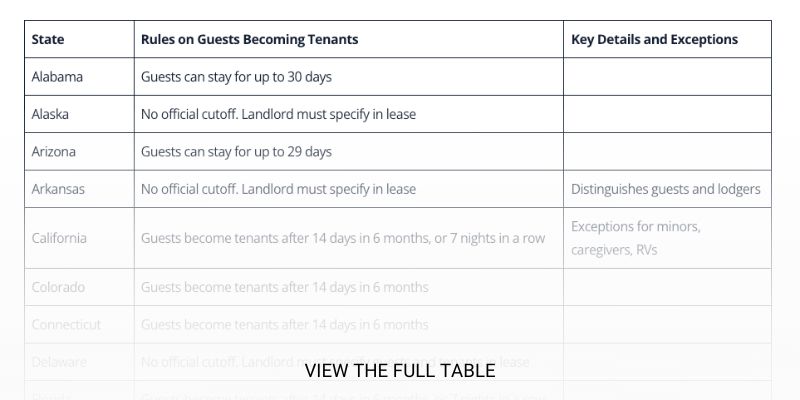Updated on October 9, 2024
When you think of squatting, you might think of someone unlawfully occupying a vacant or abandoned property. While empty vacation rentals are at risk for squatters, another kind of squatting has grabbed headlines in recent years: guests who refuse to leave a short-term rental after their reservation has ended.
Squatting can be a financial blow with loss of rents, damages to the property, and court and lawyer fees to evict the squatter. An extended eviction case can cost thousands of dollars in legal fees. Squatting is relatively rare, but some high-profile cases of short-term rental squatters remind us of the importance of prevention and being prepared to respond if it happens to you.
In this guide, we will provide you with the steps to guard against squatting and what to do if a squatter takes over your vacation rental property.
Check your state laws on squatters’ rights
You might think that if a guest stays beyond their reservation period without permission or additional payment, that would be considered trespassing. In some cases, this is true, but it depends on the length of the guest’s stay.
The first step is to educate yourself about your state laws. When does a guest become a tenant? What rights does the guest have once they’re deemed a tenant under the law?
Under most state laws, a guest can claim tenant rights after renting a property for a certain period of time. In some states, it’s 30 days; in others, it’s 14 total days over six months, for example. If your guest becomes considered a tenant under the law, you may have to go through a lengthy eviction process to get them out of your property. Many of today’s squatters are scam artists who have learned how to take advantage of tenant-landlord laws like these to commandeer your property.
The laws in your state may help you decide whether you want to accept bookings that are longer than your state’s definition. You can check your state’s specific laws by going to your state’s revised statutes webpage or referring to the handy chart in this post from Proper Insurance.

Thoroughly screen potential guests for booking red flags
Like other bad actors, squatters often raise red flags from the moment they make a booking request. Longer stays aren’t red flags themselves, but they deserve more of your attention because of the risk of the guest gaining tenant rights. If a potential guest asks to stay longer than the length of time your state law specifies, do not accept the request as an instant booking and spend more time screening them.
Other red flags and where to look for them:
- If you’re using a booking platform like Vrbo or Airbnb, avoid accepting requests from potential guests who are unverified on the platform.
- Be on the alert for missing information in a potential guest’s profile, missing or blurred profile photos, a profile made shortly before they made the booking request, and bad reviews by other hosts.
- If possible, search for the person on the internet and check out their social media profiles to gain a sense of whether they’re legitimate.
- You can also use artificial intelligence to make informed decisions about accepting or declining a reservation. Superhog offers a screening service that checks the validity of each guest’s information against multiple data sources, guarding against fraud.
- Asking plenty of questions can be a great way to flag a potential squatter because bad actors typically don’t want to answer questions. Politely ask potential guests about the purpose of their stay. If they refuse to answer or ignore your questions, reject the booking request.
Watch: Elevating Your Safety & Security for Better Stays
Covering your bases when you accept a reservation
Even if you’re comfortable enough with a guest to accept their reservation, it’s smart practice to protect yourself with the following booking steps:
- Ask your guest for a government-issued ID to confirm their identity.
- Have all guests sign a rental agreement highlighting the move-in and move-out dates. Document your rental agreement and all communications between you and the guest. This can be helpful later if you have to file an eviction case.
- Ask for a security deposit, especially for a longer-term stay. A potential squatter may not want to lose that additional money and might decide against booking.
Get squatters insurance coverage
If a squatter slips past your other screening measures, you can mitigate the expense of getting them out of your home by purchasing squatter coverage on your short-term rental insurance policy.
Some platforms, like Airbnb, offer limited protection against squatters through its insurance policies. Those policies may reimburse you for up to $1 million in damages caused by the guest-turned-squatter. However, the policies offered by platforms don’t cover loss of income or legal expenses.
Proper Insurance, which insures only short-term rentals, started offering Squatters Coverage at the beginning of 2021 in response to demand from hosts. During the Covid pandemic, guests booked longer stays than the guest-to-tenant cutoff. As a result, hosts wanted extra insurance to cover them if guests started squatting.
“We have had a few claims with it, which has helped alleviate the financial burden on the property owners,” said Nick Massey, director of sales at Proper Insurance. “Unfortunately, when you have a squatter, not only do you have legal costs to go through the courts for eviction, you also have loss of business income because clearly, they aren’t paying rent, but you also end up having damage caused by the squatter as well.”
The squatters insurance policy enhancement provides $10,000 in legal expense coverage and $20,000 in lost business income (rents). The coverage adds about $4 per month to your Proper Insurance Policy, Nick said.
What to do if a guest becomes a squatter in your vacation rental
Call your local law enforcement for guidance on how to proceed if a guest refuses to leave your property after their reservation has ended.
If the squatter has tenant rights under your state law, do not attempt to remove them from the home by changing the locks or cutting off utilities. You will need to go through the formal eviction process. Hire a real estate or landlord-tenant lawyer to guide you through the process.
…
GET UPDATES

